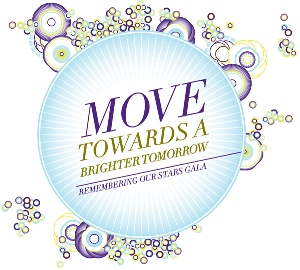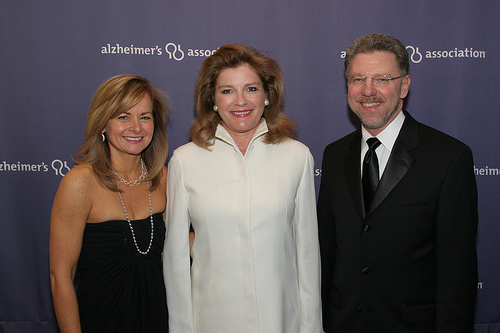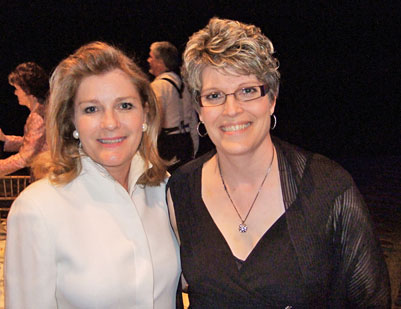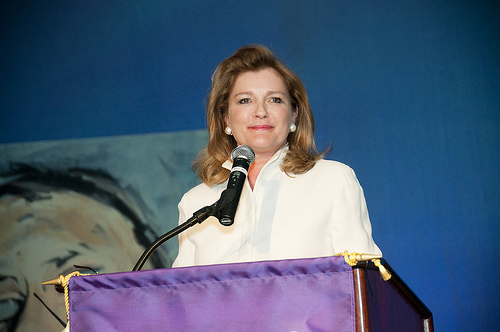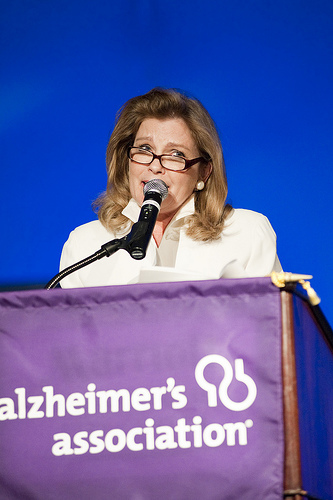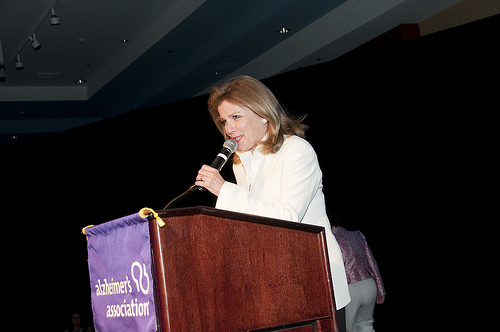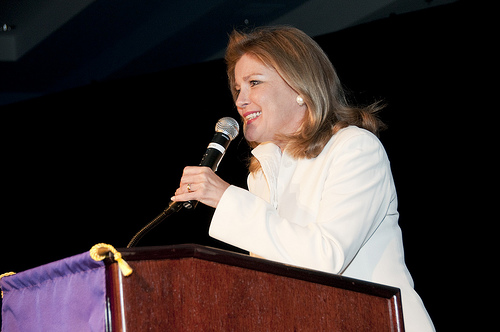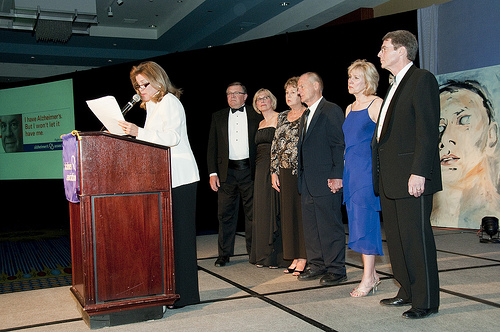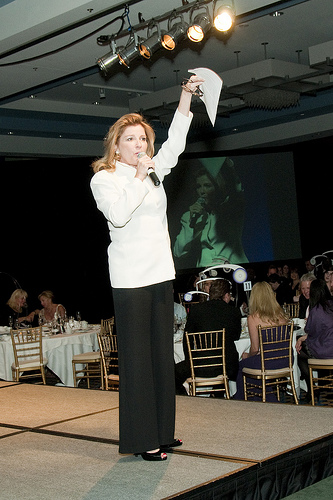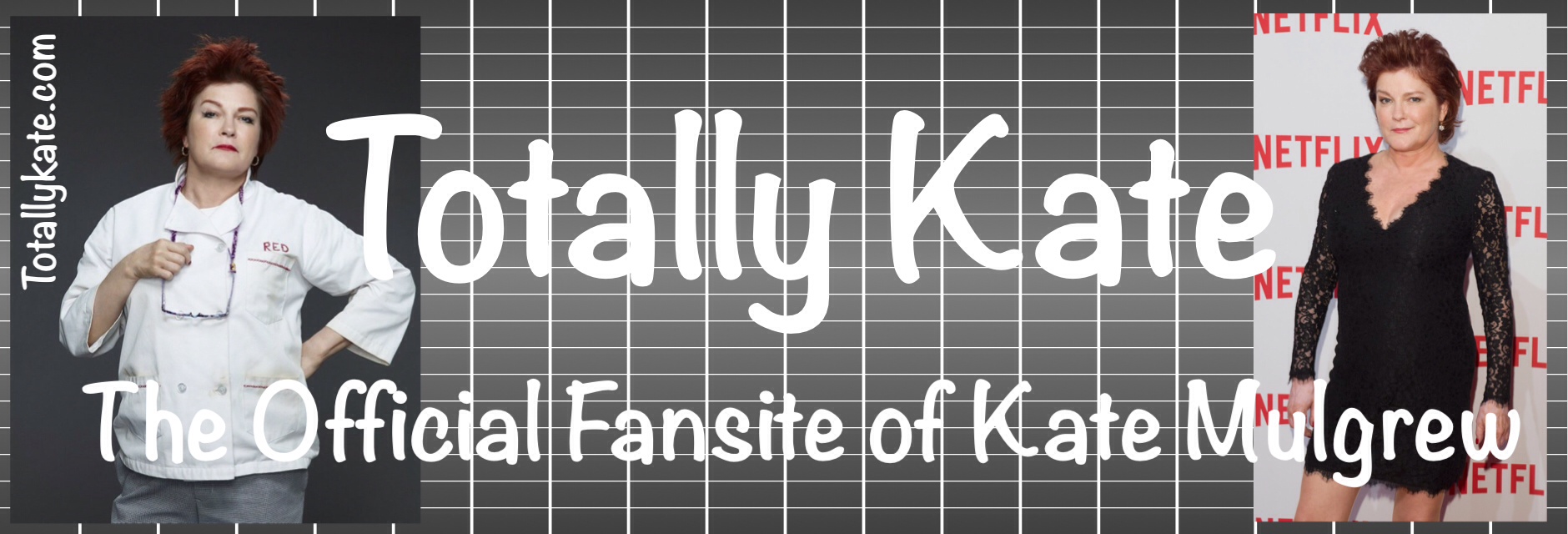Minnesota-North Dakota Chapter site. |
||||||||||||
|
|
||||||||||||
| APRIL 25, 2009
ALZHEIMER’S SPEECH/ MINNEAPOLIS There’s a storm gathering and my house lies directly in its path. In this house are my mother, my two sons and my daughter. My mother was the first to recognize the storm. She went out for a walk one day and was struck by lightening. I know this because I took her to the hospital and after a thorough examination the doctor looked at her and said, “Mrs. Mulgrew, you have Alzheimer’s Disease.” A bolt of lightening, wouldn’t you say? Or would you say that a bolt of lightening would have been better? You see, this was no garden-variety mother. Oh, no. This mother was one in a million. She was exceptional in every way and that’s why the initial diagnosis seemed erroneous, even absurd. This was a woman who was utterly original. She gave birth to eight children and buried two daughters, one a baby and the other my sister Tess, who died of a brain tumor at the age of fourteen. My mother’s grief was so complete that she went away to a Trappestine convent for 6 weeks and when she came back her forehead was bruised and lacerated and she looked at me and said, “Well, darling, that’s what happens when you beat your head against a wall.” She quit smoking there and then and returned to her first passion, which was painting. Her talent grew and with it her reputation. Her studio was full of life, Maria Callas trilled bel canto from the stereo, artists came from all over to work beside her and once I found her lying on the studio floor, her head encased in plaster. “I’m doing a death mask, Kitten, but when I’m finished I’ll split a beer with you.” When she played a Chopin nocturne on the piano, the chaos would pause and, a sweet and tender silence would fill the house. Every dinner party was unique and there were dinner parties every week. “Tonight we’re going to Barcelona,” my mother would say, chopping a pepper,” where anything can happen…and does.’ She danced with my father, her elbow on his shoulder, chin propped in her hand. She danced with someone else, too, I saw her in the moonlight, and her arms were around this man’s neck and her eyes were gazing into his. Jean Kennedy Smith was her best friend and they traveled the world together. When Jean became ambassador to Ireland, Mother often stayed with her at The Residence in Dublin. Once they sailed out into the Shannon River on a cold and rainy winter’s day and my husband, who was watching from shore, said he saw them strip off their clothes down to their knickers and, just like that, the two 65 year old women dived into the icy water, screaming with laughter. Her humor was odd, unexpected and irreverent. Many years ago, she looked hard at my teenage son, took a deep breath, and said,” You’re very handsome and I’m sure you’re very interesting but that doesn’t alter the fact that all boys between the ages of 15 and 25 should be incarcerated.” She walked through the lonely woods, collecting feathers, which she would slip into her sleeve for shadow boxes. She read voraciously and gave up Catholicism for Baruch Spinoza. Sitting at the bonfire one night she stared into the flames and whispered to me, “God is Everythingness.” Her figure was slim-hipped, fast and trim. Whenever I visited, she would greet me in the lane, arms outstretched, calling, “Kitten Kat Feathers of Joy!” So when she was diagnosed with Alzheimer’s Disease she resisted it, of course, to such an extent that she wrote crib notes on her hand during the second neurological exam. Dr. Fortson stared at her and said, “Mrs. Mulgrew, are you cheating on your Alzheimer’s test?” She gave it a beat and answered,” Wouldn’t you?” But then the weeks and months passed and time, in its inexorable way, revealed the truth. One night, my mother asked me to take her upstairs and we sat together on the bed and then she looked at me and said,” I know what this disease means, and so do they. It means the end of my brain and the end of my being. It will be horrible and slow, like turning the lights off one by one in this big old house. Like turning the lights off in the dead of winter. I can’t do that, Kitten, it’s not for me. So I’m asking you to help me. Just get the pills and put them on my bed table and I’ll do the rest. No one will know and you will have done a brave and generous thing. Otherwise, I will long to die until I don’t even understand what longing to die means. Please spare me this.” I got the pills but could not bring myself to put them on her bed stand. Instead, just as she predicted, we watched as the lights went out , one by one, and this once marvelous creature became rigid and silent and empty, stripped even of shame. One day, she simply closed her mouth to food and then to water and finally, ten days later, she died. We held the funeral mass at the Trappestine convent where she once sought solace from her grief. But not all the saints nor all the angels could comfort me that day and though the long and exacting nine years of suffering were over, all I could think about was my lovely mother’s last wish, and how I had let her down. There’s a storm gathering but it looked for a moment as if my youngest son, Alec, had brought the sunshine with him when he visited me last week. He is an artist, like his grandmother before him and, like her, he is slim-hipped, blond hair falling in lovely chaos half way down his back, a full beard, old sneakers and paint-smattered pants. Attitude. He has a one-man show coming up in Los Angeles and he is wildly excited about it, although he tries to conceal this beneath a veneer of absolute cool. His paintings are large and uncompromising, stunning in texture, original in design. He’s the real thing. He’s got “it”, just as she had. But what if he also has something else? Like the APOE 1 or APOE 2 gene? What if he is in line to inherit this disease? This idea struck me in the middle of our conversation and it almost took my breath away, because what I could barely endure happening to my mother, I know I could not possibly endure happening to my son. I came back into the conversation, as one comes into a warm room from a cold night, and I heard my son say, “I want to be like Goya – I want the courage to go out like that. At 83, let me scrawl on my last painting those words: I am still learning.” It was chilling, the thought that learning could be snatched away from him, just like that- a sleight of hand and a lifetime of passion is erased. And what of me, the actress? I have been acting for 35 years. It has been my life, my joy, my great love. When I walk on the stage, all of the uncertainties and sorrows of real life disappear and I am suspended in time, but wholly and triumphantly alive, a sense of being Total. I know what it is to be present to that which transports me and I really don’t think I want to live without it.. But what if Nature has something else in mind and is working even now to upset the order of my brain? What if She is , even as we speak, planting the tiniest of seeds which will later grow into plaques and tangles? And what if the emotion comes, and it is epic and it is glorious, but the chessboard has been upended and the neurons, once vibrant, can no longer make the leap to the other side? So they die, and the words they provide die with them, and what is left is just a mask, incapable of speech, devoid of feeling. So, although my plea is deeply personal, by 2050 Alzheimer’s Disease will affect more than 14 million of us and no one, then, will be able to turn away from the reality. We are all seeking shelter from this storm and we must fight, now, to ensure the futures of our children and grandchildren. Surely I am not alone when I think how empty life would be without the soaring voice, the hands in prayer, the masterpiece of light and shadow, the final curtain rung down on a face lifted in ecstasy? Everyone deserves a life well played. It is, after all, our only moment –it must not be allowed to end in Nothing. |
||||||||||||
